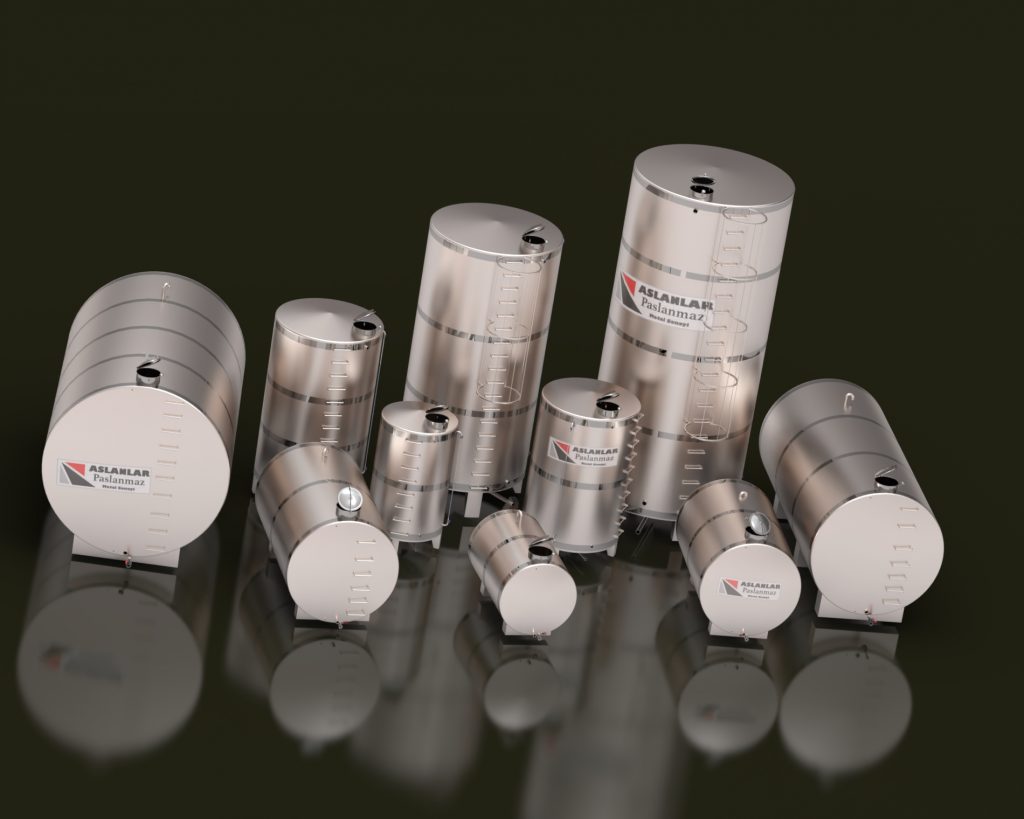The Role of Stainless Steel Milk Tanks in the Milk Industry
1. Introduction to Stainless Steel Milk Tanks
Stainless steel milk tanks are special storage units manufactured to meet the quality standards of the milk industry. The key features of stainless steel include high resistance to rust and corrosion, easy cleaning thanks to its smooth surface, and the capacity to meet hygiene standards.
Milk is a product that is naturally prone to rapid spoilage. Therefore, it is mandatory to ensure hygienic environments in both production and storage processes. Stainless steel tanks prevent milk from coming into contact with microorganisms and minimize quality loss.
2. The Importance of Milk Tanks in the Milk Industry
In milk production facilities, raw milk is generally stored in a cooled and sterile environment. Stainless steel tanks undertake the following basic functions in these processes:
- Hygiene: The smooth inner surface of the tanks prevents bacterial growth.
- Temperature Control: The cooling systems inside the tanks preserve the milk at low temperatures, preventing spoilage.
- Efficiency: Large-volume milk storage capacity speeds up production processes.
These features contribute to maintaining quality standards in the milk industry and prevent economic losses.
3. Advantages of Stainless Steel Material
Stainless steel is a frequently preferred material in sensitive sectors like the milk industry. Let’s examine the reasons for this in detail:
- Corrosion Resistance: Lactic acid and other substances in milk can corrode ordinary metal tanks. Stainless steel is resistant to these effects.
- Heat Resistance: It does not deform in processes requiring high temperatures, such as pasteurization.
- Long Lifespan: Its durable structure offers many years of use.
- Aesthetic Appearance: Its smooth and shiny surface provides a professional look.
4. Hygiene and Safety in Milk Production
Milk is a very sensitive product to bacterial growth. Therefore, ensuring hygiene standards is of great importance in the design and use of milk tanks.
- Hygienic Design: The smooth surface of the tanks prevents the accumulation of milk residues and does not allow for bacterial growth.
- Ease of Sterilization: Sterilization processes can be easily performed with chemical and steam cleaning methods.
- Legal Compliance: Stainless steel tanks comply with international food safety standards such as HACCP (Hazard Analysis and Critical Control Points).
5. Different Uses of Milk Tanks
Stainless steel milk tanks are used for many purposes in the production of different dairy products:
- Cooling Tanks: Milk from farms must be cooled immediately to prevent spoilage. These tanks keep the milk at low temperatures.
- Fermentation Tanks: Used in the production of products like yogurt, kefir, or cheese, these tanks provide the ideal environment for fermentation processes.
- Storage Tanks: In large-scale production facilities, milk is stored in these tanks for long periods.
- Transport Tanks: Portable tanks ensure the safe transportation of milk from one point to another.
Each area of use further increases the importance of milk tanks in industrial production processes.
6. Production Processes of Milk Tanks
The production of stainless steel tanks requires high precision. The production process consists of the following stages:
- Material Selection: The tanks are generally made from AISI 304 or AISI 316 stainless steel.
- Welding Processes: Advanced welding techniques used during the assembly of different parts of the tank ensure the surface is smooth and durable.
- Surface Treatments: The shiny and smooth surface is polished to meet hygiene standards.
- Testing and Certification: After production, the tanks undergo rigorous tests and are approved with quality certificates.
7. Types of Stainless Steel Milk Tanks
Stainless steel milk tanks are produced in different shapes and sizes according to their intended use:
- Horizontal Tanks: Generally used for high-volume milk storage.
- Vertical Tanks: Compact tanks that provide maximum capacity in smaller spaces.
- Portable Tanks: Used in the process of transporting milk from farms to factories.
- Fixed Tanks: Large-scale tanks permanently installed in production facilities.
8. Modern Technology in Milk Tanks
Modern stainless steel milk tanks are equipped with technology.
- Smart Sensors: They optimize production processes by monitoring temperature, pH, and fill levels.
- Automation: The cleaning, filling, and emptying of the tanks can be done automatically.
- Energy Efficiency: New generation tanks minimize energy consumption, reducing environmental impacts.
9. Environmental and Economic Benefits
Stainless steel milk tanks provide environmental sustainability and economic efficiency:
- Recyclability: Tanks that have reached the end of their service life are environmentally friendly as they are made from recyclable materials.
- Energy Savings: Highly insulated tanks reduce energy costs.
10. Maintenance and Cleaning of Stainless Steel Tanks
Regular maintenance and cleaning of the tanks are critical for the hygienic continuation of milk production.
- Chemical Cleaning: Special detergents are used to dissolve milk residues.
- Steam Cleaning: High-temperature steam destroys bacteria on the tank surface.
- Manual Maintenance: The inner and outer surfaces of the tanks should be checked at regular intervals.
11. Stainless Steel Milk Tanks in Turkey
Turkey has a rapidly developing market in milk production. Domestic manufacturers produce world-class stainless steel milk tanks and meet the increasing demands in the sector.
- Export: Turkey holds a competitive position in the international market for stainless steel tanks.
12. The Future Role of Stainless Steel Milk Tanks
Technological advancements are making stainless steel milk tanks more efficient. Environmentally friendly production processes and innovative solutions that provide energy savings will increase the importance of these tanks.
Conclusion
Stainless steel milk tanks are one of the most critical elements of the milk industry. Thanks to their features of hygiene, durability, and efficiency, they both optimize production processes and reduce environmental impacts. In the future, technological innovations will enable these tanks to develop further, increasing their role in the milk industry.


